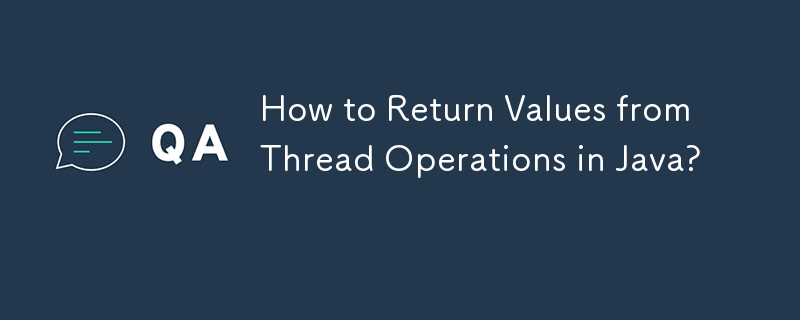

Returning Values from Thread Operations
In multithreaded programming, the interaction between threads often requires the exchange of data. One common scenario is attempting to retrieve the result of an operation performed within a separate thread.
Consider the example code below:
<code class="java">public void test() {
Thread uiThread = new HandlerThread("UIHandler") {
public synchronized void run() {
int value = 2; // To be returned to test()
}
};
uiThread.start();
}</code>In this instance, a value is modified within a separate thread (in this case, the "UIHandler"). The challenge lies in returning this value to the caller method, which needs to retrieve the modified data.
Leveraging an Object's State
One approach to this problem is to use an object's state to store and retrieve the required data. For instance, you can create a custom class that implements the Runnable interface, allowing it to be executed as a thread. Within this class, you can have a field to store the value calculated by the thread:
<code class="java">public class Foo implements Runnable {
private volatile int value;
@Override
public void run() {
value = 2;
}
public int getValue() {
return value;
}
}</code>With this implementation, you can separate the thread creation and the retrieval of the calculated value. Here's an example:
<code class="java">Foo foo = new Foo(); Thread thread = new Thread(foo); thread.start(); thread.join(); int value = foo.getValue(); // Retrieve the modified value</code>
Key Considerations
It's important to note that threads do not natively return values. By referencing a thread like an ordinary class and requesting its value using methods like getValue(), you can bridge this gap. Additionally, you should ensure synchronization mechanisms to prevent data race conditions and maintain thread safety.
The above is the detailed content of How to Return Values from Thread Operations in Java?. For more information, please follow other related articles on the PHP Chinese website!
 How to learn go language from 0 basics
How to learn go language from 0 basics
 What currency is BTC?
What currency is BTC?
 Characteristics of relational databases
Characteristics of relational databases
 What is machine language
What is machine language
 c/s architecture and b/s architecture
c/s architecture and b/s architecture
 Reasons why ping fails
Reasons why ping fails
 What is a servo motor
What is a servo motor
 The difference between win10 home version and professional version
The difference between win10 home version and professional version
 How do mysql and redis ensure double-write consistency?
How do mysql and redis ensure double-write consistency?




